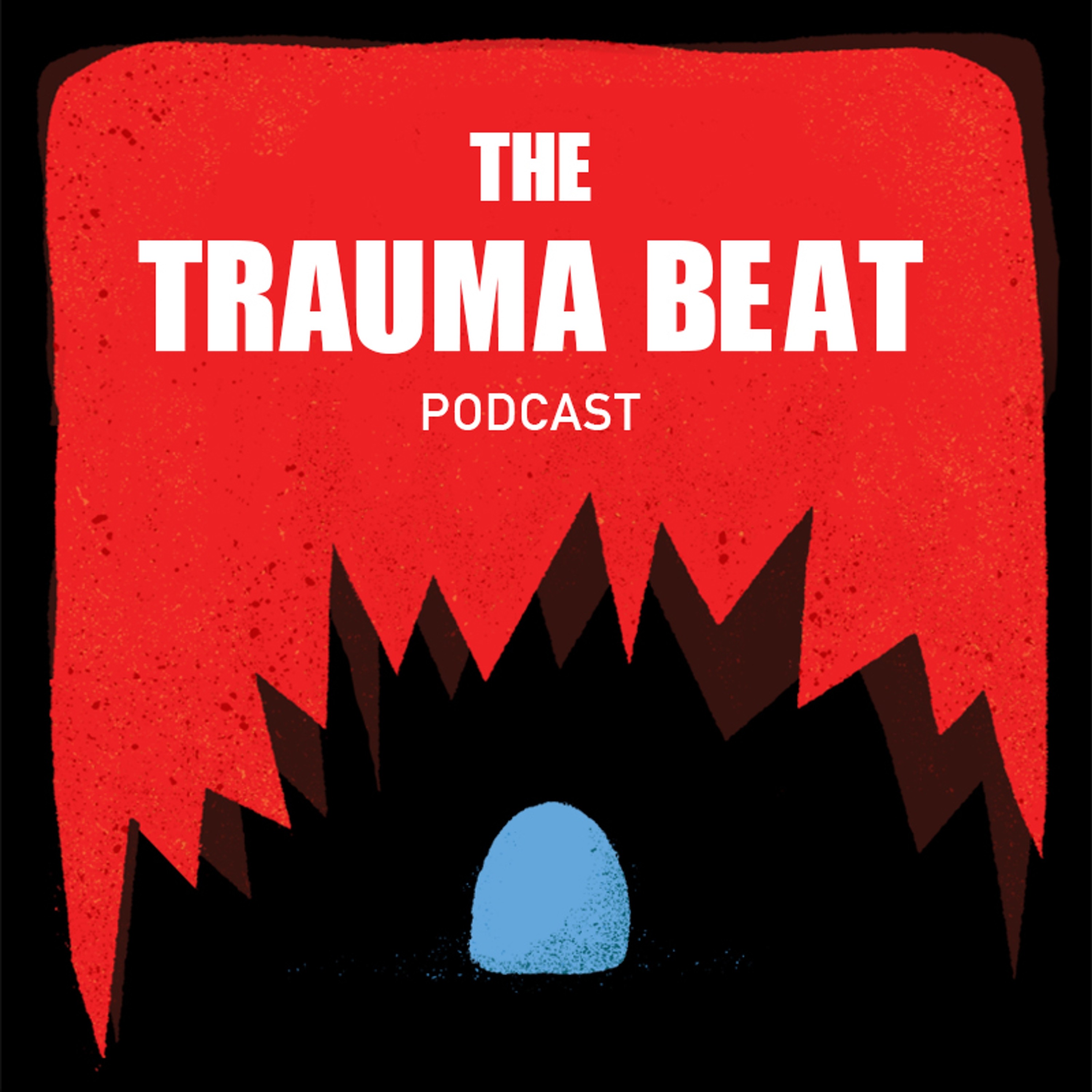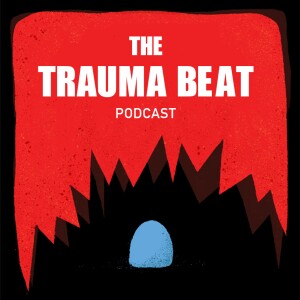
3.4K
Downloads
23
Episodes
Hosted by award-winning journalist, trauma researcher and author Tamara Cherry, The Trauma Beat podcast features conversations with trauma survivors, survivor support workers, investigators and journalists. From homicides to traffic fatalities and sexual violence to mass violence, The Trauma Beat explores how the news media covers traumatic events, the impact this coverage has on survivors and journalists, and how we all might be able to tell (and consume) these very important stories, better. Based on Tamara’s book, The Trauma Beat: A Case for Re-Thinking the Business of Bad News.
Episodes

Monday Jun 17, 2024
The Impact of Graphic Imagery w/ Heather Martin
Monday Jun 17, 2024
Monday Jun 17, 2024
As she prepares to mark 25 years since the mass shooting at her high school that made headlines around the world, Heather Martin speaks with Tamara about the impact the media had on her in the immediate aftermath of the Columbine High School shooting, and for several years that followed.
Tamara asks Heather for her reaction to The Washington Post’s decision to publish graphic imagery from the immediate aftermath of various mass shootings.
Heather speaks specifically about the impact of the media on physically uninjured survivors, the control (or lack thereof) that victims and survivors have over the way their stories are collected and shared, and the opportunity journalists have to help survivors with their post-traumatic growth.
Resources:
As per trauma-informed practice, each guest in The Trauma Beat podcast is afforded the opportunity to review and veto a list of anticipated questions before the recorded conversation. Ongoing, informed consent is sought throughout the production process.
This conversation was recorded in March 2024.
For more trauma-informed journalism resources, visit pickupcommunications.com.

Monday Jun 10, 2024
Chasing Trauma for Network TV w/ Elisa Toha
Monday Jun 10, 2024
Monday Jun 10, 2024
Elisa Toha’s path to becoming a trauma therapist was not exactly a conventional one. Before she began her career helping people through their trauma, she spent years chasing trauma around the United States as a chase producer, or booker, for major network morning shows and CNN.
From her home in New York City, where she was based as an Emmy-award-winning journalist and now works as a therapist, Elisa discusses her career as a booker in a highly competitive media market in which journalists are often flown to traumatic events even before family members have been notified that their loved ones were killed. Elisa and Tamara share anecdotes of being directed to do tasks that went against their moral compasses, and the moral injury they suffered as a result.
Tamara and Elisa grapple with the ethics of trauma journalism, the importance of self-care for journalists who cover trauma, and ideas for how traumatic stories can be told, better.
Resources:
As per trauma-informed practice, each guest in The Trauma Beat podcast is afforded the opportunity to review and veto a list of anticipated questions before the recorded conversation. Ongoing, informed consent is sought throughout the production process.
This conversation was recorded in January 2024.
For more trauma-informed storytelling resources, visit pickupcommunications.com.

Monday Jun 03, 2024
His Name was Marvin Engelbrecht w/ Semon Engelbrecht
Monday Jun 03, 2024
Monday Jun 03, 2024
Marvin Engelbrecht was walking his dog near his home in Toronto when he was shot and killed on October 29, 2012. But it was nearly a year before then crime reporter Tamara Cherry first heard his name, delivered during at a news conference where police announced Marvin had been killed in a “random act of violence.” The murder of Marvin Engelbrecht — a young Black man killed in a neighbourhood that had experienced a disproportionate amount of gun violence — would stick with Tamara for all the years that followed. It bugged her that, even though he had been publicly identified in the immediate aftermath of his homicide, she didn’t know his name until police revealed he had been killed at random.
In this episode, Marvin’s mother, Semon Engelbrecht, tells Tamara about Marvin and the impact his death, and lack of media attention it garnered, had on her family. She also speaks about the problematic way in which the media gives more attention to some homicides over others. Semon and Tamara also discuss grief, healing from traumatic loss, and what she’s learned since Marvin died, including the fact that “things that happen to you aren’t losses. They’re lessons.”
As per trauma-informed practice, each guest in The Trauma Beat podcast is afforded the opportunity to review and veto a list of anticipated questions before the recorded conversation. Ongoing, informed consent is sought throughout the production process.
This conversation was recorded in May 2024.
For more trauma-informed storytelling resources, visit pickupcommunications.com.

Friday May 24, 2024
The Trauma Beat Season 2 Trailer
Friday May 24, 2024
Friday May 24, 2024
From the author of The Trauma Beat: A Case for Re-Thinking the Business of Bad News comes another season of conversations that are meant to make us think differently about the way bad-news stories are collected and shared.
Unlike Season 1, which included almost exclusively conversations with trauma survivors speaking about the impact of the media coverage of their traumatic events, Season 2 will bring together voices from various other stakeholders: journalists, researchers, front-line service providers. And of course, there will be the voices of survivors, including in a very special season opener.
What impact does trauma have on journalists who are covering it? What is the cost for those who feel compelled to report traumatic stories in a way that goes against their moral code? Can those graphic crime-scene photos really spur social change? When does the harm outweigh the good? These questions and more will be tackled in Season 2 of The Trauma Beat.
For more information, including resources for trauma-informed storytelling, visit pickupcommunications.com.

Monday Nov 20, 2023
The Trauma Beat - #11 - Brett Holzhauer
Monday Nov 20, 2023
Monday Nov 20, 2023
Brett Holzhauer was in the library of Santa Monica College, a journalism student studying for his last exam, when he heard the first bang. For the self-proclaimed gun advocate, that bang and the many bangs that followed were unmistakable: gunfire.
His first encounter with the media came just moments after he had a gun pointed in his face, just moments after he crawled and ran to safety, and just moments after seeing the shooter dead outside the building.
He wasn’t ready to do an interview yet, but being a journalism student, he felt it was his duty.
“I gave one interview. One turned to two, to five, to seven, to 10, and I forget the exact count, but I think in a two-hour span, I probably did 35 interviews,” he recalls in conversation with host Tamara Cherry, exactly nine years after that day. “I think that there is this mass land grab of, ‘Who was there, who can we talk to, who can we get a hot quote from’ and then everyone just kind of throws up their hands like, ‘Okay, thanks for the help. See you later.’ And there’s never a follow-up.”
Speaking two weeks after the mass shooting at Robb Elementary School in Uvalde, Texas, Brett discusses the impact that media coverage of other incidents of mass violence has had on him. He also questions whether it is the responsibility of a journalist to follow up with trauma survivors after highly emotional interviews, and the consequences of not doing so.
Brett and Tamara consider what support should look like for survivors in the immediate aftermath of traumatic and high-profile events. “There’s got to be a more ethically sound way to do these things that is centered around the community or the city that is more organized, rather than just this manic free-for-all,” Brett says. He refers to the media coverage of the Uvalde shooting and how one network anchor comforted a grieving father on live television.
Referring to the Parkland high school and Sandy Hook elementary school shootings, Brett also speaks about the harm he has felt from media coverage that seems to focus so quickly on the debate over the Second Amendment.
As per trauma-informed practice, each guest in The Trauma Beat podcast is afforded the opportunity to review and veto a list of anticipated questions before the recorded conversation. Ongoing, informed consent is sought throughout the production process.
This conversation was recorded in June 2022.
For more trauma-informed journalism resources, visit pickupcommunications.com.
If you'd like to be a guest on the show or inquire about sponsorship opportunities, please email contact@pickupcommunications.com.

Monday Nov 13, 2023
The Trauma Beat - #10 - Elynne Greene
Monday Nov 13, 2023
Monday Nov 13, 2023
For more than three decades, Elynne Greene answered the call to help those who were confronted by the unimaginable. From homicides and traffic fatalities, to sexual violence and human trafficking, to the “One October” mass shooting on the Las Vegas strip, the recently retired manager of Victim Services for Las Vegas Metropolitan Police Department has supported countless trauma survivors through their darkest days.
And through it all, Elynne’s job has included at least some involvement with the media — a rare quality for victim services personnel. She has seen how the media can harm, and how the media can help. In conversation with Tamara Cherry, she provides invaluable advice for journalists, victim service providers and investigators, including how they can work together to support survivors, and each other.
Elynne and her team supported victims and survivors in the hours, weeks, months, and years that followed One October, as it came to be known, when a gunman opened fire on a crowd of outdoor concert goers. She recalls those chaotic first hours of supporting survivors who didn’t know whether their loved ones were among the dead, and how, as the story stretched on, the media favored certain survivors over others.
Elynne discusses the methodologies (reaching out to survivors, showing up at their home), language (for example, words used to describe sexually exploited children), and elements journalists often use to tell their stories (for example, images of body bags and car wrecks, sounds of gunshots, and identifiable crime scene photos), and how these common practices in the newsgathering and storytelling process can negatively impact survivors. She also speaks to the importance of not perpetuating myths about crimes like human trafficking.
Elynne also unpacks the importance of supporting survivors throughout the media process, from providing them with the information they need to make an informed choice to engage (or not) with the media, to preparing them for an interview, and advocating for them if things go sideways.
As per trauma-informed practice, each guest in The Trauma Beat podcast is afforded the opportunity to review and veto a list of anticipated questions before the recorded conversation. Ongoing, informed consent is sought throughout the production process.
This conversation was recorded in March 2022. Elynne retired from her post at the Las Vegas Metropolitan Police Department in 2023.
For more trauma-informed journalism resources, visit pickupcommunications.com.
If you'd like to be a guest on the show or inquire about sponsorship opportunities, please email contact@pickupcommunications.com.

Monday Nov 06, 2023
The Trauma Beat - #9 - Cijay Morgan
Monday Nov 06, 2023
Monday Nov 06, 2023
Agnes Morgan was a devoted parishioner who headed up not one, but several committees at her church. She was also a mother with gentle lessons. Her resting face was a smile. There were so many delightful things about her.
But when she was struck and killed by a drunk driver in 2013, she became, quite simply, “senior citizen.”
“My mom didn’t die because she was a 77-year-old lady crossing the street,” Agnes’s daughter, Cijay Morgan, says in conversation with host Tamara Cherry. “My mom died because somebody chose to drink for 14 hours and then get behind the wheel of a car instead of staying where he was.”
From questions asked of survivors to words and photos used in stories, Cijay discusses the basic building blocks of a journalist’s story that can be of the utmost significance to a victim’s family. Cijay speaks about the impact of media coverage of other impaired driving cases. “The world just starts spinning,” she says.
Cijay also shares advice for other survivors faced with media coverage, including the importance of appointing someone to field calls from journalists. “This is your time. And if closing all the curtains and doors and going into your basement is how you’re going to handle it, then do that. You don’t owe any interviews, appearances.”
As per trauma-informed practice, each guest in The Trauma Beat podcast is afforded the opportunity to review and veto a list of anticipated questions before the recorded conversation. Ongoing, informed consent is sought throughout the production process.
This conversation was recorded in March 2022.
For more trauma-informed journalism resources, visit pickupcommunications.com.
If you'd like to be a guest on the show or inquire about sponsorship opportunities, please email contact@pickupcommunications.com.

Monday Oct 30, 2023
The Trauma Beat - #8 - Louise Godbold
Monday Oct 30, 2023
Monday Oct 30, 2023
Louise (Lou) Godbold is many things.
She is a silence breaker, a trauma expert, and a non-profit leader. But the title most often associated with Lou in her conversations with the media — and there have been many — is “Weinstein survivor.”
“I speak a lot with survivors of sexual violence, and I speak a lot with those who have that next layer of trauma…where they're exposed to a lot of media interest, not because of who they are, but because of who their abuser is,” Lou says in conversation with host Tamara Cherry. “And that's a very unique situation to live through.”
Lou recalls a three-hour interview she granted for a documentary, during which she disclosed childhood sexual abuse that she had not yet disclosed to her mother. She describes the harmful events that followed, when she (wrongly, as it turned out) assumed that this portion of her interview would make it into the documentary.
Lou provides invaluable insight into how journalists can tell the very important stories of trauma survivors, better. She also has advice for survivors who might be faced with media attention. She discusses the problem of survivors feeling like commodities that are “disposed of” following their interviews. She also explains the physiological impact of trauma, including how repeating one’s traumatic story can lead to long-term physical health problems, and the importance of centering a survivor’s experience throughout the facts-gathering and storytelling process.
“Ask the survivor what works for them,” Lou says. “That is what being survivor centered is all about. That is what being trauma informed is all about.”
Resources:
Do No Harm: A Media Code of Conduct for Interviewing Trauma Survivors: https://psmag.com/ideas/a-code-of-conduct-for-how-media-should-interview-survivors-of-sexual-trauma
Echo Training: https://www.echotraining.org/trauma-training/
Infographic: How to Support Someone Who Has Experienced Trauma: https://www.echotraining.org/support-trauma-survivor-infographic/
Infographic: Trauma-Informed Arrow: https://www.echoparenting.org/dev/wp-content/uploads/2018/08/Echo_Arrow_Print_8x11.pdf
Survivor Questions for Reporters: https://www.echoparenting.org/dev/wp-content/uploads/2023/10/SurvivorQuestions_Poster_CMYK.pdf
Silence and Omissions: A Media Guide for Covering Gender-Based Violence: https://gbvjournalism.org/
This conversation was recorded in March 2022.
As per trauma-informed practice, each guest in The Trauma Beat podcast is afforded the opportunity to review and veto a list of anticipated questions before the recorded conversation. Ongoing, informed consent is sought throughout the production process.
For more trauma-informed journalism resources, visit pickupcommunications.com.
If you'd like to be a guest on the show or inquire about sponsorship opportunities, please email contact@pickupcommunications.com.
